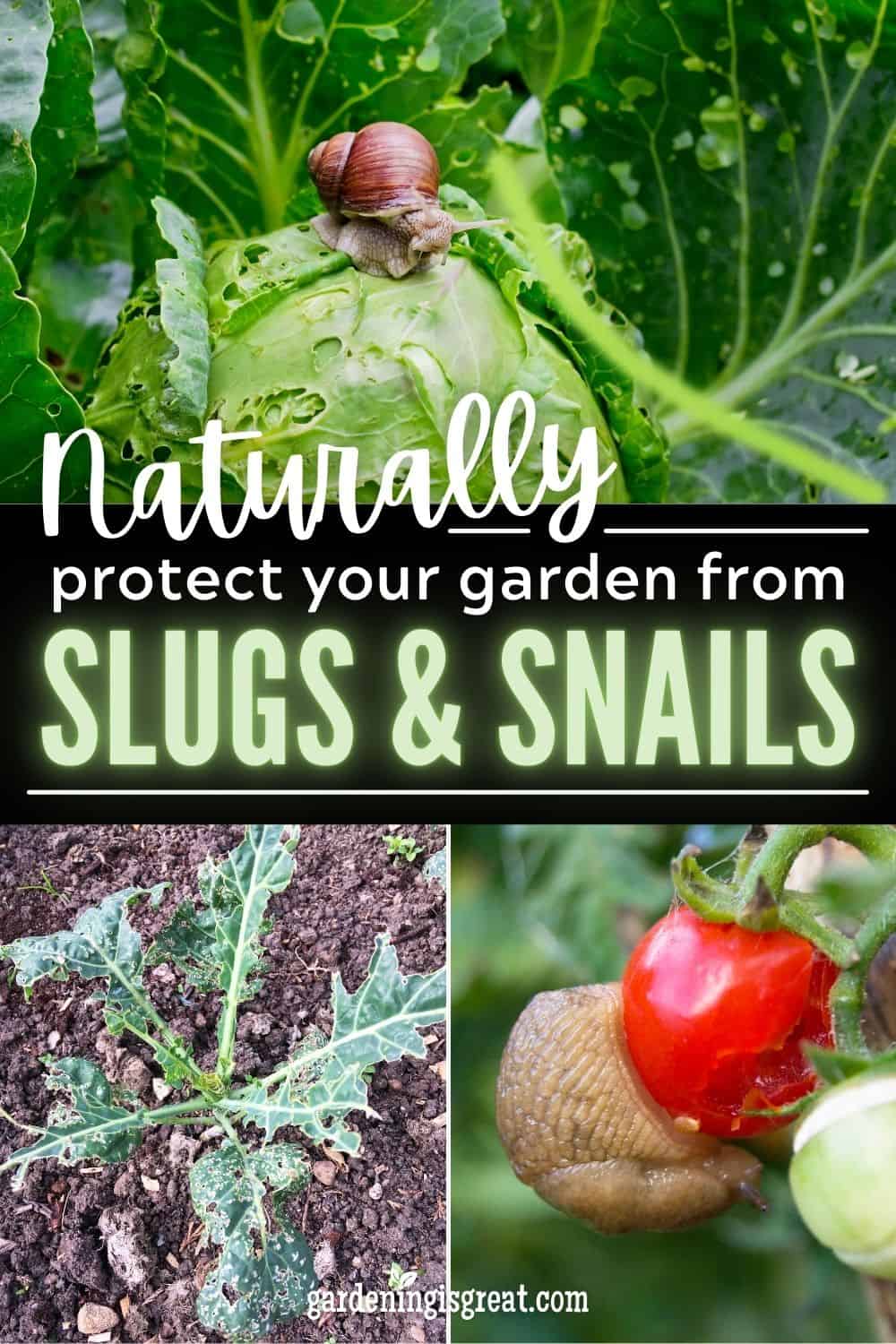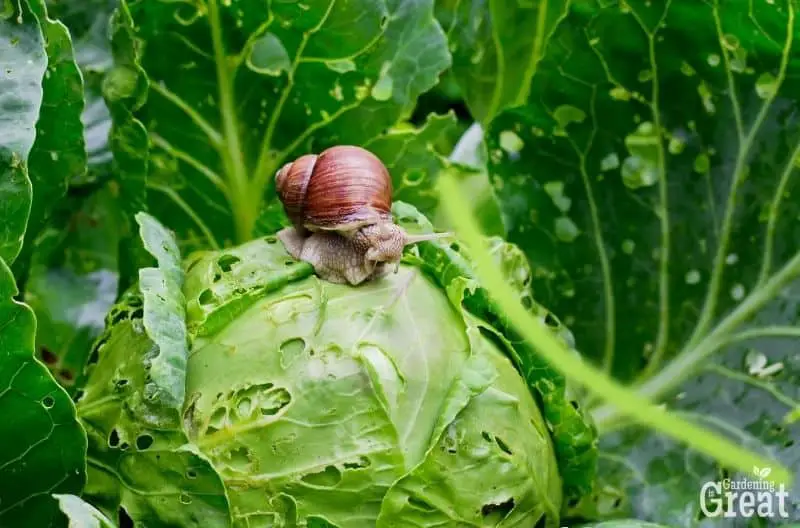Natural Ways to Protect Your Garden from Slugs and Snails
The last thing you want is to be overrun by slugs and snails in your garden. They can cause major damage to your plants, flowers, and vegetables.
This blog post will discuss some natural ways of protecting your garden from slugs and snails, so you don’t have to resort to chemicals or commercial products.

How do I get rid of slugs and snails in my garden naturally?
Of course, you could go out to your garden after dark each night and go slug and snail hunting with a flashlight. Thankfully, there are less time-consuming ways to attract and trap the little critters.
You can also use strategies to deter them, by using plants and barriers.
And finally, you can do away with them by using natural products to kill them or by encouraging natural predators to do the job for you.
The most effective way to keep slugs and snails out of your garden is to use not just one, but a combination of natural methods.
Lure them into a trap
Slugs and snails love a dark, moist environment. Make a simple trap by leaving a moist pile of kitchen fruit and veg scraps or marigold flowers and leaves (they love to eat marigolds). Pop-out after dark and collect them up.
What you do with them next is up to you… I put mine in a container with a little bit of water in the bottom and leave it on the bird table for the birds to dispose of.
Upturned trays and pots also make good traps.
Beer traps
It might seem like a waste of beer, but beer traps are very effective at attracting and trapping slugs.
You can make a beer trap by using an empty, shallow container. Bury it in the ground near the plants you want to protect and half fill it with beer. Leave the top of the container sticking out of the ground by about an inch, to stop beetles from falling in.
The slug will be attracted by the smell of the beer, fall in and drown. The downside of this method is that you’ll need to replace the beer every couple of days.
Create a sharp, jagged barrier
Both snails and slugs have soft mollusk bodies, so a sharp, jagged barrier such as broken eggshells, pine needles, or sharp sand and grit will discourage them from crawling over the barrier to get to your plants. Another benefit of using eggshells is that they fertilize the soil too!
Create a slippery barrier
This method is useful for protecting plants in containers and pots.
Apply a ring of petroleum jelly, or, spray lubricating oil for vehicles around the pot. Either one makes it hard for slugs and snails to grip the surface and climb.
What plants repel slugs and snails?
Certain plants emit a smell that slugs and snails don’t like. Herbs with strong fragrances like lavender and rosemary are great options to plant around your garden.
Not only will they help to repel slugs and snails, but they’re also great additions to any garden. Euphorbias and foxgloves are toxic and will be avoided by slugs and snails alike.
Use copper
Create a slug-free zone with copper products. Copper is an effective long-term way to deter slugs and snails from your plants because it doesn’t wash off in the rain and can be left in place all year round.
However, it does benefit from being cleaned with vinegar every now and again so it doesn’t tarnish, otherwise, it loses its effectiveness.
How does copper stop slugs and snails?
When slugs and snails come into contact with copper, the mucus in their bodies reacts with the metal and gives them a tiny electric shock.
There are lots of copper products on the market that are suitable for different spots in your garden.
Self-adhesive copper tape works well around pots and containers and marks off pathways, whereas copper wire mesh can create an effective barrier around planting areas. Choose whichever option is best for your budget and garden size.
Use coffee grounds
Caffeine solutions and coffee grounds are a great way to get rid of slugs and snails.
Do coffee grounds deter slugs and snails?
A study showed that a caffeine solution of 1-2% in fact kills most slugs and snails within a couple of days.
Bear in mind that instant coffee only has .5% caffeine, but brewed coffee is much higher. The stronger the coffee, the better.
The study also found that a caffeine solution was more effective than using grounds, so don’t tip away the remains of your morning coffee – use it in the garden and pour it around the border of the planting areas!
If you don’t drink coffee, just pop into a local coffee shop or cafe – most offer used coffee grounds for free.
You can just sprinkle the grounds around your garden. It will also fertilize your garden, so it’s a win-win!
Use salt – with caution
Salt can be an effective way to deal with slugs and snails. The downside of course is that too much salt will harm your plants so use with care! If you have pathways around your planted areas, sprinkle salt on the path to act as a barrier.
Alternatively, use something like seaweed mulch around plants – the salt in the seaweed will deter the creatures and the seaweed also acts as fantastic fertilizer.
Does salt kill slugs and snails?
Some people think salt melts the creatures. It does kill them but not by melting them. The salt combines with their mucus to create a saline solution that dries them out. Vinegar works in a similar way, but you’d need to spray vinegar onto the creatures.
Encourage slug and snail predators
Help keep down the number of slugs and snails by encouraging wildlife that eats them. Birds, frogs, toads, newts, badgers, and hedgehogs all love a slug or snail dinner.
So do chickens, so if you have a homestead, let your chickens run free and they’ll singlehandedly control a whole host of pests!
Encourage frogs or newts by setting out shallow containers in the ground and keep them filled with water.
Birds can be encouraged with water too, as they love to bathe in shallow water. Add bird feeders and places where birds can nest, and you’ll soon have plenty of birds to help you control the slug and snail population.

So, now that you know the most effective natural ways to protect your garden from slugs and snails, it’s time for you to take action!
The best way to do this is by applying a combination of these tips on a regular basis so pests don’t have the chance to wreak havoc on your plants or vegetables.
Now go get rid of those pesky pests already!

